It’s not often that one reads the news and sees a familiar face. I had this experience a few weeks ago. While scrolling through the internet, a picture jumped out at me. It wasn’t one of someone famous, or of a friend or relative. But as I looked at it, I knew that I had met this family before. Then it hit me. My wife and I had cross paths with this man and his wife several years ago in Tbilisi while getting together with some mutual friends. I couldn’t remember the exact setting, and I couldn’t remember much of the occasion either, other than the wife being pregnant at the time, and the husband being very passionate about things in conversation. Then I read the headline, American Family Killed in the Republic of Georgia, and my heart sank.
On 4 July, a senseless act of violence had taken the lives of Ryan and Lora Smith and their four-year-old son Caleb while they were camping in the mountains. While an investigation and court case were still ongoing, a 20-year-old shepherd had been charged with murdering the family and assaulting Lora. Over the coming weeks, I followed the news and communicated with our mutual friends to learn more about the situation. The more I heard about the Smiths and their lives, the more I felt compelled to learn. While I have known many wonderful people from many countries over the years, the stories I was hearing about the Smiths showed me that the world had lost a family of incredible calibre, and Azerbaijanis had lost friends that were in some cases closer than their own kin (which is an incredible feat in a land with such tight-knit relationships). Though their lives may have been short, they were certainly not empty, and it is my hope that some of their fullness can live on through their story.
Where it all started
There are many ways and many places this story could begin. Like most of us Ryan and Lora’s younger years had their share of ups and downs. But perhaps the best place to start is in 2002, when Ryan, a single man in his early 20s, moved to Azerbaijan as a student studying the language and culture. One of his teachers, Naila Mammadova, shared that he was an excellent student, and he mastered the language quite well. During this time, Ryan would frequent the Old City, where he became fascinated by the beautiful carpets on display. Aside from buying some for himself, he began researching the ancient art behind their making.
Eventually, this led him to the Qusar area, where a particular style of carpets known as sumakh were created by the Lezgi people. For centuries, every Lezgi girl joined her mother at the loom from the time she was a small child in preparation for the day that she would weave her own sumakh as part of the dowry for her wedding. These carpets were also commonly sold to passing traders and became a valuable export from this region.
At the time Ryan came, there were only about 100 women still practising this art. In an era dominated by cheaply manufactured goods, their tradition was being smothered. This bothered Ryan, and he took it upon himself to launch a project called Dugul Looms (Dugul is a Lezgi word meaning “roots”). He hoped to help revive their traditions, but sadly various circumstances in his life changed and he found himself headed back to the US in 2005 without having realized this dream.
Where two threads intertwined
For Ryan, this turned out to be a good move, because it led to him meeting Lora. Lora’s friends shared how she was pretty picky about men and had made it clear she wasn’t going to marry someone unless he was a truly good man. In an Azerbaijani-language interview one year ago with Radio Marneuli’s program Women’s World, Lora shared how it had been difficult waiting into her early 30s for a good man to come around, but when Ryan showed up, he was worth it. Eventually, he convinced her to get on a plane with him for Azerbaijan, where he took her to his favourite place in the world, the waterfalls at Laza in the Quba region. It was there that he asked her to be his bride. As you can guess, she agreed, and in 2009 the two were married.
Two years later, they had the chance to return to the Caucasus. They moved to the Republic of Georgia, where Lora took a job working as an English teacher with a Georgian government program. This job placed her in an Azerbaijani school in an Azerbaijani populated region of Georgia traditionally known as Borchali. Ryan was elated, because he recognized the name of this region as the name of the design in one of the Azerbaijani rugs he had in his collection from his earlier years in Baku. Over the coming months, he began to explore various villages in the hopes that he would find some weavers, but instead learned that the state of carpetmaking was worse than it had been in Qusar. He only made a few contacts with weavers, and at first, none of them seemed promising for starting a project like he had done with Dugul Looms.
|
Azerbaijanis in Georgia
World politics over the last several centuries has led to the way that the current borders of Azerbaijan are drawn, but historically Azerbaijanis have lived in many other places. Today, there are millions living in the surrounding countries of Iran, Georgia and Russia, as well as large diaspora populations in other former Soviet countries and around the world.
|
Finally, a solid lead popped up, and he found himself headed to the village of Garachirp with a bag of yarn. There, he met two women who agreed to each weave rugs for him. Progress was slow at first. As things moved forward, though, more women became interested. This meant that they needed more looms. Because of their sturdy wooden design, some old looms had been converted into chicken coops. With the Smith’s help, they were soon cleaned and restored. In the early days, they saw 11 women from impoverished situations come together to form the foundation of Ryan’s business, reWoven.
Ryan discusses rug designs with his weavers
Where the tangles become beautiful
As reWoven struggled to grow over the following years, so did the Smith family. They had the sorrow of experiencing several miscarriages, and the loss of their firstborn daughter, Shannon, at the age of nine days. Finally, in 2014 Ryan and Lora were blessed with their son Caleb. As he grew, he quickly became Ryan’s helper, and accompanied his parents on visits to the villages where reWoven was working. He was a brave, outgoing child, and was always happy to meet new people. Those that knew him described him as joyful and fearless. Friends shared that on one family ski trip he stood between Ryan’s legs while he rode his snowboard, never wanting to go inside to warm up and eat lunch. As he got older, he started attending an Azerbaijani baghcha (preschool), and one friend who saw him just a few weeks before his death said he was already speaking Azerbaijani quite well. For Caleb, no place was more his home than in the mountains surrounded by sheep and Azerbaijani friends.
Life for the Smiths was about far more than just rugs. Those that knew them say that their passion was for the people. Ryan and Lora saw these proud, beautiful Azerbaijanis, still living in mountain villages close to their ancient roots, and they fell in love. As Teresa Hamlin, owner of the company Azerbaijani Socks shared, They valued the people so much that they became just like them. They chose to live like the local people, speak their language, and eat their food. Friends shared how you almost couldn’t tell that they were Americans anymore. They stayed up late like Azerbaijanis, would receive guests at any hour, and were always quick to extend hospitality in their humble apartment, where their balcony overflowed with yarn. One friend even noted how Ryan learned to drive like the locals and joked that when he heard of their untimely passing, he was sure it was from a car accident.
Lora was known for her amazing heart, which was open to everyone. She had a way of making everyone around her feel like her best friend. She was like an angel to me, one of her Azerbaijani neighbours said through tear-filled eyes. She explained that Lora would frequently show up when she was having a difficult time and bring her comfort and encouragement. The two women would often sit and share life and tea while their children played together or would watch each other’s children when they needed to go somewhere. In reflecting on Lora’s life, her neighbour felt one thing she had demonstrated to her and that needed to be heard in this situation was that we need to love people, because life is short.
Really, it was their love for other people that defined Ryan and Lora for those that knew them. Their friends commented on how you saw this in the way they used their money. At first they saw Ryan’s simple wardrobe of jeans and old T-shirts and found him odd. His car wasn’t anything special either. One neighbour, Shahin Aliyev, shared about a conversation the two had, where he asked Ryan, Why are you still driving this old car? It’s shaky and makes a lot of noise, why don’t you go buy another one? Ryan replied to this, explaining that the car still drove fine, and whenever the car finally died and he had to bury it, then he would go and get a new one. Ryan and Lora simply felt that they had better uses for their money than suits and ties and nice cars.
For them, they could see no better way to spend their money than in serving the people around them. I heard story after story of people who received help for medical treatments, legal fees, food during difficult times, and clothing for their children. Once reWoven’s business started to take off, Shahin asked Ryan, So what are you going to do with all of that money? Ryan responded, I’m going to ask the people in the villages what they want to do with it. It is their money, they earned it with their hands.
So with $10,000 in rug profits, he drove his rickety car up the mountain roads to find out what the villagers felt they needed. Eventually, with the input of the whole community, they came to the conclusion that their school needed repairs, and their community hall, where weddings, funerals and other events were held, needed new dishes. So Ryan took the money and invested it in new plastic windows for the school and 400 sets of new dishes to replace the cracked and broken ones. On top of that, as time went on, the profits were turned back into the communities in other ways, including providing funding for cancer treatment.
Ryan’s mother, Lin, shared how they had currently been in the middle of a project to build a playground in Marneuli. It would have been the first one in the entire Azerbaijani-populated area of Georgia. Now, with the Smith’s passing and with reWoven struggling to cope, she was praying that somehow this final dream of her son’s could be realized.
Shahin’s wife Shamisiyya told me more about their plans for this playground. While it was in-tended to be a place for children to play, they were also designing it in such a way as to provide plenty of seating for busy mothers to be able to sit and rest for a bit. Ryan and Lora always cared about helping women in need, she said. Because of the challenging economic situation in Georgia’s Azerbaijani villages, many women’s home lives can be quite difficult.
Shahin shared how one time, another woman they knew showed up in the middle of the night at the Smith’s house with her children in tow. Her husband was drunk and angry and had violently thrown them out on the street. Without hesitating, the Smiths opened their home to them. A while later, the woman’s husband showed up in a rage, wanting to continue beating his wife. Ryan threw himself between them and shielded the family while he tried to calm the husband down. When he refused and turned his assault on Ryan, Ryan never hit him back, but simply grabbed him in a tight hug and refused to let him go until he finally calmed down and left.
One friend once asked the Smiths about why they were always opening their home up to people in difficult circumstances, even to total strangers. Without hesitating, Ryan replied: Why do we live on this earth? It’s to help others.
Where the weaving stops
When one looks at the life of the Smiths, one has to wonder where such love came from. One answer can be seen in looking at their families. Ryan’s mother shared, Our family wants the full truth and just consequences. The shepherd’s horrific actions will rob our family of many years of joy with Ryan, Lora and Caleb, particularly watching Caleb grow up. However, we chose to forgive the shepherd for his despicable assault on Lora and murderous actions against our precious family. We are praying that the shepherd will confess his sins to God and receive full forgiveness and peace with God.
The Smith family’s final communication came through a text message to Shahin. The two families hoped to get together when the Aliyevs returned from a trip to Batumi. Ryan, who was already in the mountains with his family, sent a picture of Lora and Caleb smiling by their tent in a field of grass and wildflowers with green peaks fading into the distance, and told him, Come, but we are already far away.
Shahin wiped away a tear as he looked at the picture of his friends standing in mountainous paradise. They are far away now, but some day we will go to be with them again, and that will be a good day.
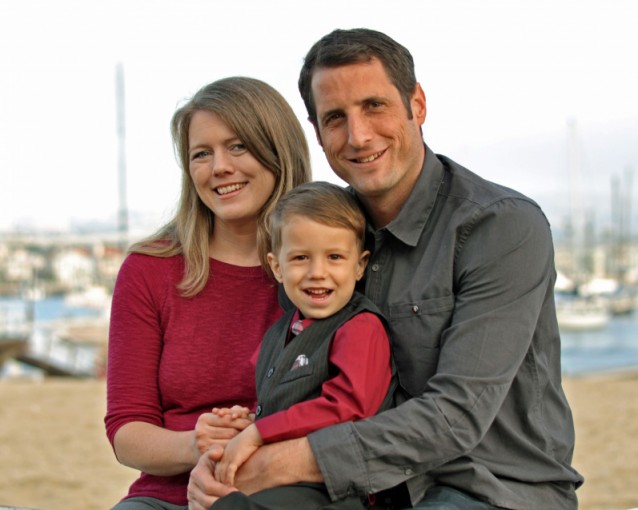
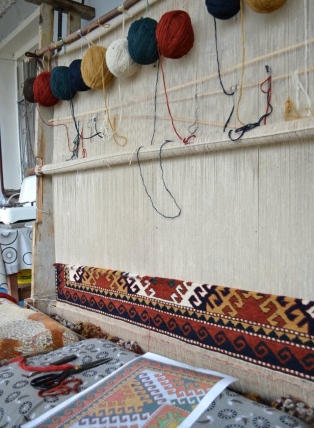
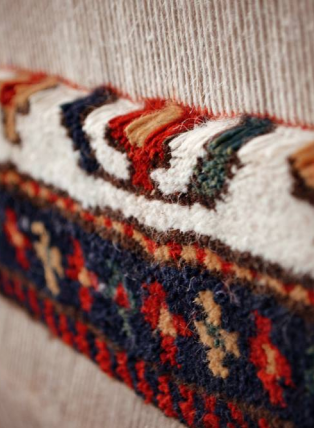
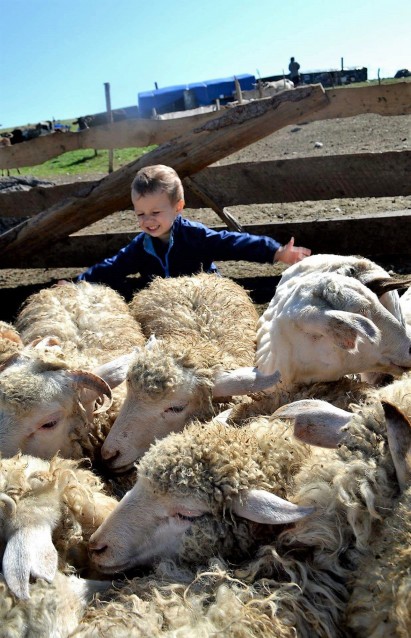
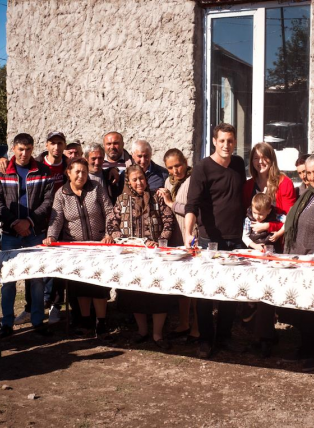
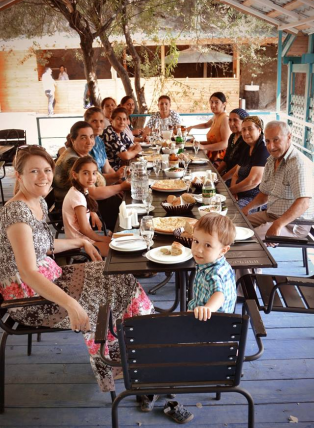
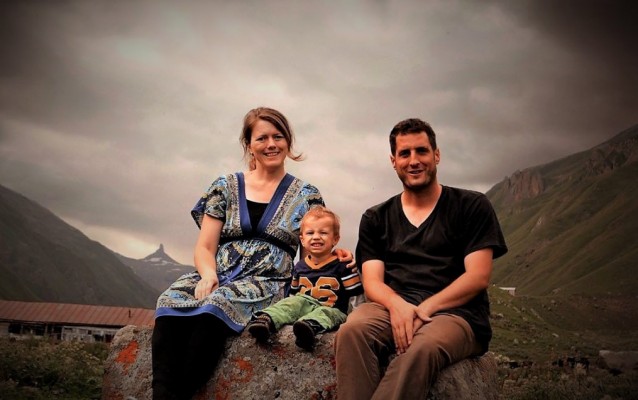


.jpg)